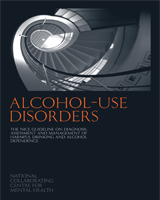All rights reserved. No part of this book may be reprinted or reproduced or utilised in any form or by any electronic, mechanical, or other means, now known or hereafter invented, including photocopying and recording, or in any information storage or retrieval system, without permission in writing from the publishers. Enquiries in this regard should be directed to the British Psychological Society.
NCBI Bookshelf. A service of the National Library of Medicine, National Institutes of Health.
National Collaborating Centre for Mental Health (UK). Alcohol-Use Disorders: Diagnosis, Assessment and Management of Harmful Drinking and Alcohol Dependence. Leicester (UK): British Psychological Society (UK); 2011. (NICE Clinical Guidelines, No. 115.)

Alcohol-Use Disorders: Diagnosis, Assessment and Management of Harmful Drinking and Alcohol Dependence.
Show details- For people who misuse alcohol, what are their experiences of having problems with alcohol, of access to services and of treatment?
- For families and carers of people who misuse alcohol, what are their experiences of caring for people with an alcohol problem and what support is available for families and carers?
- In adults with alcohol misuse, what is the clinical efficacy, cost effectiveness, and safety of, and patient satisfaction associated with different systems for the organisation of care?
- What are the most effective (a) diagnostic and (b) assessment tools for alcohol dependence and harmful alcohol use?
- What are the most effective ways of monitoring clinical progress in alcohol dependence and harmful alcohol use?
- To answer questions 4 and 5, what are the advantages, disadvantages, and clinical utility of:
- the structure of the overall clinical assessment
- biological measures
- psychological/behavioural measures
- neuropsychiatric measures (including cognitive impairment)
- physical assessment?
- In adults in planned alcohol withdrawal, what is the clinical efficacy, cost effectiveness, safety of, and patient satisfaction associated with:
- preparatory work before withdrawal
- different drug regimens
- the setting (that is, community, residential or inpatient)?
- In adults in planned alcohol withdrawal what factors influence the choice of setting in terms of clinical and cost effectiveness including:
- severity of the alcohol disorder
- physical comorbidities
- psychological comorbidities
- social factors.
- In adults with harmful or dependent alcohol use what are the preferred structures for and components of community-based and residential specialist alcohol services to promote long-term clinical and cost-effective outcomes?
- For people with alcohol dependence or who are harmful drinkers, is psychological treatment x when compared with y, more clinically and cost effective and does this depend on:
- presence of comorbidities
- subtypes (matching effects)
- therapist-related factors (quality, therapeutic alliance, competence, training, and so on).
- What are the most effective (a) diagnostic and (b) assessment tools for alcohol dependence and harmful alcohol use in children and young people (aged 10–18 years)?
- What are the most effective ways of monitoring clinical progress in alcohol dependence and harmful alcohol use in children and young people (aged 10–18 years)?
- For children and young people with alcohol dependence or harmful alcohol use is treatment x when compared with y more clinically and cost effective and does this depend on the presence of comorbidities?
- For people with alcohol dependence or harmful alcohol use, what pharmacological interventions are more clinically and cost effective? In addition:
- What are the impacts of severity and comorbities on outcomes?
- When should pharmacological treatments be initiated and for what duration should they be prescribed?
- Alcohol use disorders: harmful drinking and alcohol dependence: Evidence Update January 2013: A summary of selected new evidence relevant to NICE clinical guideline 115 'Alcohol use disorders: diagnosis, assessment and management of harmful drinking and alcohol dependence' (2011)
- 2019 surveillance of alcohol-use disorders (NICE guidelines PH24 and CG115)
- Review questions - Alcohol-Use DisordersReview questions - Alcohol-Use Disorders
- Bicc1 (39)BioSample
Your browsing activity is empty.
Activity recording is turned off.
See more...